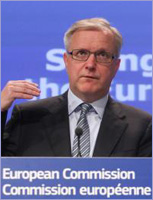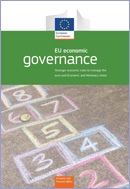|
|
|
|
|
|
|
|
 |
 |
 |
 |
European economic forecast – spring 2012: slow recovery in sight
According to the spring forecast released on 11 May, real GDP is projected to stagnate this year in the EU and to contract slightly in the euro area. However, strong policy actions and major advancements in the EU institutional framework have brought about an easing of financial market tensions in the beginning of 2012 and a tentative stabilisation of confidence, expected to strengthen over the forecast horizon. Together with an expected acceleration in global growth, a gradual recovery is forecast to start in the second half of the year and gather speed in 2013. The unemployment rate, which lags changes in economic activity, is expected to remain at 10.3% in the EU and at 11% in the euro area in 2012 and 2013.
|
 |
 |
 |
|
 |
 |
 |
 |
 |
|
 |
 |
 |
A recovery is in sight, but the economic situation remains fragile, with still large disparities across Member States… Sound public finances are the condition for lasting growth, and building on the new strong framework for economic governance, we must support the adjustment by accelerating stability and growth-enhancing policies.
Olli Rehn, European Commission Vice-President and Commissioner for Economic and Monetary Affairs and the Euro
|
 |
|
|
|
 |
 |
 |
 |
“Seizing the moment to boost growth”: 9th May message from the European Commission
José Manuel Barroso, President of the European Commission, and Olli Rehn, European Commission Vice-President and Commissioner for Economic and Monetary Affairs and the Euro, have urged the EU to “seize the moment to have growth and stability in Europe.” At a joint press conference to commemorate Europe Day celebrations on 9 May, Barroso and Rehn emphasised the importance of a “twin track approach” to recovery that gives equal weight to both stability and growth while at the same time asserting that debt fuelled growth is unsustainable. They laid out the EU’s recipe for recovery as outlined in a special statement issued for Schuman Day: staying the course on stability without being blind to an evolving economic situation; accelerating structural reforms; and stepping up investment through vehicles such as project bonds and an increase in the lending capacity of the European Investment Bank. Barroso and Rehn called on all European stakeholders to step up their efforts for growth and jobs by accelerating the delivery of the Europe 2020 strategy.
|
 |
|
 |

|
|
 |
 |
 |
 |
Ageing report: Europe needs to prepare for growing older
The age profile of the EU is expected to change dramatically in the coming decades, according to the EU's latest Ageing report that was published on 15 May. The EU population will in 2060 have slightly risen from 502 million of 2010 to around 517 million. And it will be much older. According to projections, by 2060 nearly one in three citizens will be aged 65 or over while the share of those aged 15-64 will decline from 67% to 56%. As a consequence, the EU will move from having four people of working-age to each person aged over 65 years to about two people of working-age. The decline in the workforce will act as a drag on growth and per capita income, and will put pressure on public finances in the EU. However, the report shows a large diversity across EU Member States, depending notably on progress with pension reforms.
|
 |
|
 |

|
|
 |
 |
 |
 |
President Barroso calls for “leadership and ownership” to spur European renewal
José Manuel Barroso, President of the European Commission, said “it is time to show the same speed and determination in implementing our growth agenda as we have already shown in fiscal consolidation.” Barroso addressed participants in the ‘State of the Union’ Conference on 9 May in Florence, Italy, that was organised by the European University Institute. He emphasised that growth and stability go hand in hand; the choice is unsustainable short-term stimulus that will lead to a short-lived re-launch of growth versus sustainable long-term reforms that will make a difference over time. Calling for a European renewal, Barroso said “We are building a Union able to withstand all weathers,we need Europeans for all seasons…what we need more than anything else is leadership and ownership.”
|
 |
|
 |

|
|
 |
 |
 |
 |
Mission concludes Romania’s economic programme broadly on track
Staff teams from the World Bank (WB), European Commission (EC), and the International Monetary Fund (IMF), visited Bucharest from April 24 until May 9 to review Romania’s economic programme. They concluded that the programme remains broadly on track. All end-March 2012 quantitative performance criteria in the Stand-By Arrangement with the IMF were observed except the one on central government arrears, which was missed by a small margin. Given the weak situation in the euro area, the staff teams project growth in Romania to be around 1½% in 2012, driven by domestic demand and better absorption of EU funds. The 2012 cash budget deficit will increase slightly to 2.2% of GDP. Progress has been mixed in implementing structural reforms needed to boost economic growth, create jobs and improve Romanians’ living standards. The next review mission is expected to take place from late July to early August 2012.
|
 |
|
 |

|
|
 |
 |
 |
 |
ECFIN at Europe Day
More than 20 000 visitors passed by the Commission's Berlaymont building in Brussels, which opened to the public on 12 May to commemorate Europe Day. On 9 May 1950, the French foreign minister Robert Schuman invited the countries of Europe to take part in a common political project. Europe Day is organised every year to celebrate European integration. The commemoration this year provided a good opportunity for ECFIN, which had its own stand, to engage with interested citizens and discuss and inform the public on topical issues, such as aspects of the crisis, the new EU economic governance, and the tenth anniversary of the introduction of euro banknotes and coins. Posters, leaflets and booklets of general interest were distributed, while the younger generation had fun putting together puzzles of euro coins and banknotes.
|
 |
|
 |

|
|
|
|
 |
 |
 |
 |
EU Economic governance. Stronger economic rules to manage the euro and Economic and Monetary Union
This leaflet summarises the main objectives and elements of the enhanced EU economic governance, the biggest reform of Economic and Monetary Union (EMU) since its creation. Beyond strengthening rules on the fiscal, the macroeconomic, and the institutional side, the EU economic growth strategy “Europe 2020” is the way forward to ensure economic growth with high employment, productivity and social cohesion. Ten years after the introduction of euro banknotes and coins, these combined efforts should allow the benefits of EMU and the euro to fully materialise.
|
|
 |

|

|
|
|
|
|
|
|
|
|
|
|
|
|
|

|
|
Directorate-General for Economic and Financial Affairs
|

|
|